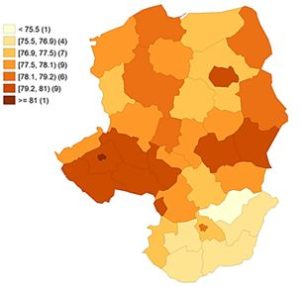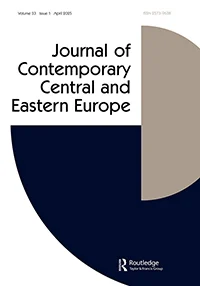Wellbeing and environmental performance of the Visegrad countries
at the beginning of the 21st century
Csaba Lakócai

Figure: Life expectancy at birth in the NUTS2 regions of the Visegrad countries in 2019
Following the dissolution of state-socialist systems, there was a rapid institutional convergence between postsocialist Central and Eastern Europe (CEE) and the West. However, the institutional convergence was accompanied by a decline in formal economic development indicators and quality of life in most CEE countries, thereby further increasing the socioeconomic divergence from Western Europe. This study analyzes the wellbeing and environmental performance of four Central and Eastern European countries, collectively referred to as the Visegrad countries (V4), namely the Czech Republic, Hungary, Poland and Slovakia, from the second half of the 2000s until the end of the 2010s. It also analyses the pre-pandemic social conditions at the NUTS2 regional level. The analysis of the temporal trends is based on two composite indices, which are the Sustainable Society Index (SSI) and the Happy Planet Index (HPI), along with their respective sub-indicators. Regional data analysis includes life expectancy at birth as outcome variable and four additional regional socioeconomic variables.
Main findings of the paper:
- Time-series analyses show that the V4 countries achieved a level at which social improvement can be decoupled from direct environmental impact. However, these countries relied on traditional developmental state policies instead of shifting toward greater environmental protection during the examined period;
- Regional analysis confirms the findings of the panel analysis; in order to enhance their social performance, the V4 must reinforce their social policies, particularly in the lagging regions;
- Formal market-economic measures, such as GDP per capita, are not the primary determinants of socioeconomic development and environmental policy performance.
Based on the findings, the principal recommendation of the paper is that the Visegrad countries prioritize social and environmental objectives over the pursuit of economic growth at any cost in order to enhance the quality of life. The external social, economic and political turbulence of the early 2020s may impede the achievement of these objectives. However, the changing conditions may also facilitate a social and ecological transition if the decision-makers recognize that the goal should not be to restore the conditions before 2020, but to ensure that the transition meets the social and environmental aspects of sustainability.
Further research on this topic may involve the analysis of the entire postsocialist Europe, with the objective of examining the similarities and differences between the wellbeing and sustainability indicators of these countries, in comparison to each other and to global trends. Furthermore, the analysis of the breaking point effect in the early 2020s is a subject that will also be relevant for academic research in the near future.
Lakócai, C. (2025). Wellbeing and environmental performance of the Visegrad countries at the beginning of the 21st century. Journal of Contemporary Central and Eastern Europe, 1–16. https://doi.org/10.1080/25739638.2025.2507607



